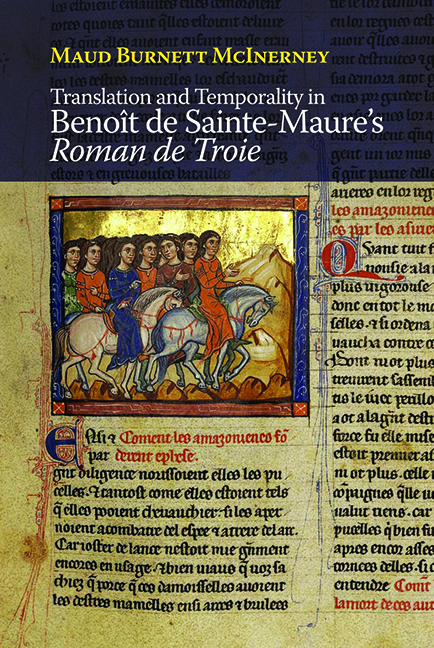Book contents
- Frontmatter
- Dedication
- Contents
- Acknowledgements
- List of Abbreviations
- Introduction: Trojan Time Machines
- 1 A Cupboard in Athens: Translating Troy
- 2 A Very Old Book, or How to Predict the Past
- 3 Ladies’ Time
- 4 Queer Time for Heroes
- 5 Hector in the Alabaster Chamber: Ekphrasis and its Discontents
- Conclusion: Trojan Futurities
- Appendix: The Manuscript Tradition of the Roman de Troie
- Bibliography
- Index
- Gallica
Appendix: The Manuscript Tradition of the Roman de Troie
Published online by Cambridge University Press: 07 October 2022
- Frontmatter
- Dedication
- Contents
- Acknowledgements
- List of Abbreviations
- Introduction: Trojan Time Machines
- 1 A Cupboard in Athens: Translating Troy
- 2 A Very Old Book, or How to Predict the Past
- 3 Ladies’ Time
- 4 Queer Time for Heroes
- 5 Hector in the Alabaster Chamber: Ekphrasis and its Discontents
- Conclusion: Trojan Futurities
- Appendix: The Manuscript Tradition of the Roman de Troie
- Bibliography
- Index
- Gallica
Summary
I know of districts in which the young men prostrate themselves before books and kiss their pages in a barbarous manner, but they do not know how to decipher a single letter. Epidemics, heretical conflicts, peregrinations which inevitably degenerate into banditry, have decimated the population. I believe I have mentioned suicides, more and more frequent with the years. Perhaps my old age and fearfulness deceive me, but I suspect that the human species – the unique species – is about to be extinguished, but the Library will endure: illuminated, solitary, infinite, perfectly motionless, equipped with precious volumes, useless, incorruptible, secret.
– Jorge Luis Borges, The Library of BabelTurning to the manuscript tradition of the Roman de Troie, especially in this Plague Year of 2020, it is difficult not to feel like the weary narrator of Borges's “Library of Babel.” True, the manuscripts of the Troie are not infinite; thirty complete witnesses survive, and thirty-one fragments. Yet the potential relationships between these manuscripts generate a virtually infinite number of possible texts, a fact which has not yet been sufficiently explored, at least not in scholarship in English. In these few pages, I will attempt to give a bird's eye view of the situation, with special attention to the questions of which texts were grouped with the Troie and what such groupings might tell us about the reception of the text, especially in the thirteenth and fourteenth centuries. Increasingly, the manuscripts (especially those in Paris) are available online, which is a great boon to scholars;3 because the pandemic curtailed travel to see others for myself, I am deeply indebted to Marc-René Jung's encyclopedic La légende de Troie en France au moyen âge, which attempts nothing less than a complete catalogue of the more than 350 French manuscripts containing one version or another of the Troy story: the Roman de Troie and its mises en prose, French translations of Dares (usually part of the Histoire ancienne jusqu’à César), French translations and adaptations of Guido delle Colonne's Latin mise en prose of Benoît, and a few other related texts.
There are two major schools of textual criticism. The first, named for Karl Lachmann, attempts to reconstruct a lost original by classifying manuscripts into families according to shared errors and their treatment of difficult passages, thus trying to establish what the author actually wrote.
- Type
- Chapter
- Information
- Publisher: Boydell & BrewerPrint publication year: 2021



